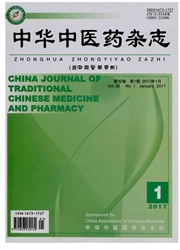

 中文摘要:
中文摘要:
目的:探讨螺旋环螺旋结构域扩散激酶(CHUK)基因表达水平及其多态性与缺血性中风风痰瘀阻证、气虚血瘀证的易感性及炎性细胞因子的关联。方法:采用实时荧光定量PCR(RT-PCR)测定CHUK基因表达水平,Sequenom Mass ARRAY i PLEX进行基因分型,运用ELISA检测炎性细胞因子(IL-1β,IL-6,IL-8,IL-12,TNF-α)血清水平。结果:缺血性中风风痰瘀阻证、气虚血瘀证患者的CHUK基因表达水平均显著高于对照组(P〈0.001)。CHUK基因的rs3808916、rs2230804、rs3808917多态性与中风风痰瘀阻证、气虚血瘀证的易感性均无统计学关联。在气虚血瘀证患者中,rs2230804位点AA基因型携带者的IL-8、TNF-α血清含量均显著低于GG+GA基因型携带者(P〈0.05,P〈0.01),rs3808917位点AA基因型携带者的TNF-α血清含量显著低于CC+CA基因型携带者(P〈0.01),且气虚血瘀证患者的IL-8、TNF-α血清水平均显著高于对照组(P〈0.001)。结论:CHUK基因表达水平影响缺血性中风风痰瘀阻证、气虚血瘀证的发生,且CHUK基因多态性影响中风气虚血瘀证的炎性反应。
 英文摘要:
英文摘要:
Objective: To investigate the correlations between the expression of conserved helix-loop-helix ubiquitous kinase(CHUK) gene as well as polymorphism of CHUK and the susceptibility of ischemia apoplexy with syndrome of windphlegm stasis and syndrome of Qi deficiency and blood stasis as well as inflammatory cytokines. Methods: The expression CHUK gene was determined by using RT-PCR technology, and the gene sequence-based typing was tested by using Sequenom Mass ARRAY i PLEX technology. The levels of IL-1b, IL-6, IL-8, IL-12, and TNF-α in serum were tested by using ELISA. Results: The CHUK gene expression level of apoplexy patients with syndrome of wind-phlegm stasis and syndrome of Qi deficiency and blood stasis was higher than that of control group(P〈0.001). There was no significant correlation between polymorphism of rs3808916, rs2230804, and rs3808917 of CHUK gene and syndrome of wind-phlegm stasis as well as syndrome of Qi deficiency and blood stasis. In the patients with syndrome of Qi deficiency and blood stasis, the levels of IL-8 and TNF-αin serum of carrier of AA gene in rs2230804 locus were both lower than that of carriers with another genes(P〈0.05, P〈0.01). The level of TNF-α in serum of carrier of AA gene in rs3808917 locus was significantly lower than that of carriers with another genes(P〈0.01), and the levels of IL-8 and TNF-α of patients with syndrome of Qi deficiency and blood stasis were significantly higher than that of control group(P〈0.001). Conclusion: The expression level of CHUK gene influences the occurrence of ischemic apoplexy with syndrome of wind-phlegm stasis and syndrome of Qi deficiency and blood stasis, and the polymorphism of CHUK gene influences the inflammatory of apoplexy with syndrome of Qi deficiency and blood stasis.
 同期刊论文项目
同期刊论文项目
 同项目期刊论文
同项目期刊论文
 期刊信息
期刊信息
